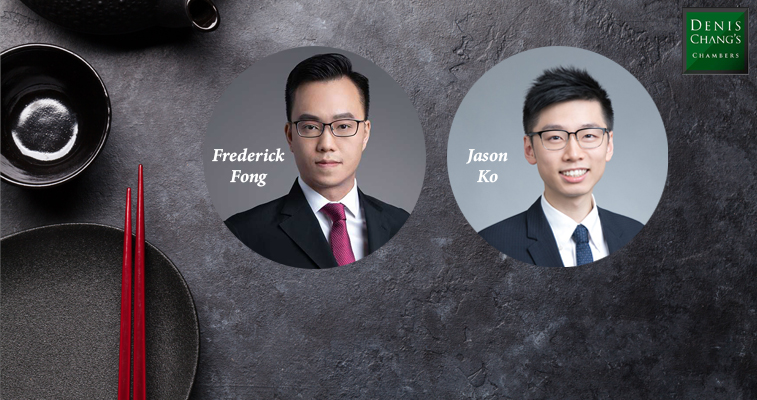Bankruptcy Law — Court declares third-generation scion of Fook Lam Moon Restaurant bankrupt after revoking the approval of his individual voluntary arrangement proposal
The Court found that some of Chui’s alleged debts owing to his own family members were not established on a balance of probabilities, and ordered that the approval of the individual voluntary arrangement proposal be revoked.
Re Chui Tak Keung Duncan
| Reference: | • HCBI 2/2021; [2022] HKCFI 2962 |
| Court: | Court of First Instance |
| Before: | Hon Cheng J |
| Appearance: | • Frederick Fong and Jason Ko acted respectively for two of the creditors in HCBI 2/2021; [2022] HKCFI 2962.
• Jason Ko acted for the successful petitioner in HCB 7518/2020; [2022] HKCFI 3480. |
| Dates of Decisions: | • 30 September 2022 (HCBI 2/2021; [2022] HKCFI 2962)
• 17 November 2022 (HCB 7518/2020; [2022] HKCFI 3480) |
Overview
In November 2020, a bankruptcy petition was filed against Mr Chui Tak Keung Duncan (“Chui”), the grandchild of the founder of famous Cantonese restaurant Fook Lam Moon. Chui sought an interim order and made an individual voluntary arrangement proposal (“IVA Proposal”) for creditors to approve. The IVA Proposal was approved by 79.38% of the creditors in value voting at the creditors’ meeting, barely passing the requisite threshold of 75%.
However, some creditors applied to challenge the approval on the ground of material irregularity under section 20J of the Bankruptcy Ordinance (Cap 6). Allowing the application, the learned Judge found that some of Chui’s alleged debts owing to his own family members (“the Family Debts”) were not established on a balance of probabilities, and ordered that the approval be revoked: Re Chui Tak Keung Duncan (HCBI 2/2021) [2022] HKCFI 2962.
With the approval of IVA Proposal revoked, the bankruptcy petition was proceeded with. Chui contested the petition on the ground that the debt was already repaid. Finding that Chui failed to adduce sufficiently precise evidence to establish a bona fide dispute as to the debt, the Court ordered that Chui be declared bankrupt: Re Chui Tak Keung Duncan (HCB 7518/2020) [2022] HKCFI 3480.

The Bankruptcy Petition
On 10 November 2020, Profit Pig Enterprises Limited (“Profit Big”) (formerly known as VIP Credit Limited) filed a bankruptcy petition against Chui, the third-generation family member of the founder of legendary Fook Lam Moon Restaurant, based on an outstanding debt of HK$1,074,000 (“the Debt”) arising out of a loan agreement.
Chui applied for an interim order under sections 20 and 20A of the Bankruptcy Ordinance (Cap 6) (“BO”), seeking to stay the proceedings against him for the purpose of processing his IVA Proposal.
Approval of the Individual Voluntary Arrangement Proposal
Chui filed his IVA Proposal in accordance with section 20A of the BO and rule 122C of the Bankruptcy Rules (Cap 6A) (“BR”). Under the IVA Proposal, Chui proposed HK$13 million to be provided by a “white knight” as a full and final settlement of 3.19% of all his indebtedness. According to the IVA Proposal, Chui’s debts included HK$206,800,000 owed to his family members (“the Family Members”).
The Court granted an interim order which precluded any bankruptcy petition from being presented or proceeded with while the order remained in force.
On 24 March 2021, Chui’s creditors met to consider the IVA Proposal which contained updated figures of his outstanding debts (“the Meeting”). It was only revealed for the first time at the Meeting that the claims of the Family Members had increased significantly from HK$206,800,000 to HK$427,822,285, resulting in a greater voting power on the part of the Family Members at the Meeting.
During the Meeting, another creditor namely Zhongcai Finance Limited (“Zhongcai”) asked whether the Family Members would waive their debts for voting purposes. Chui responded that the Family Members would exercise their rights to vote, but would forgo their rights to receive dividend distribution under the IVA Proposal.
The IVA Proposal was eventually approved by 79.38% of the vote by value of the creditors’ claims, including those of the Family Members, and those creditors who voted by proxy such as Bosonic Limited. The approval was binding on all creditors and shielded Chui from bankruptcy.
Legal Challenges against the IVA Proposal
After the Meeting, both Zhongcai and Profit Big applied under section 20J of BO to revoke or suspend the approval of the IVA Proposal. Both creditors complained that material irregularities occurred at the Meeting within the meaning of section 20J(1)(b) of BO:
• The Family Debts were not genuine. The increase in the amount of Family Debts was a manipulation of the IVA process and contrary to principles of good faith;
• The nominees failed to properly discharge their duties in admitting the Family Debts and failed to provide proof of them before or after the Meeting;
• Chui failed to give full and frank disclosure as to the Family Debts, which materially affected the creditors’ assessment of the IVA Proposal.
Zhongcai’s application was supported by Bosonic Limited, whose position is that it would not have voted in favour of the IVA Proposal if it had been notified of the increase of claims of Family Members.
Revoking approval of the IVA Proposal
The learned judge summarized the applicable principles underlying the statutory scheme for IVAs (Judgment §§16-30):
• A debtor has a duty to give full and frank disclosure of his affairs. It is essential that no opportunity should be given to an unscrupulous debtor to bypass the procedures devised to identify those who should be subject to the full investigation process of bankruptcy: Chin Wai Kay Geordie v Mok Yu Hon [2012] 2 HKLRD 657.
• An irregularity in a statement of affairs or a proposal for an IVA is capable of constituting an irregularity for the purposes of section 20J(1)(b): Re Chin Wai Kay Geordie [2010] 3 HKLRD 456.
• The information that is provided by a debtor in his statement of affairs must not be false or misleading, and it must also be complete: Cadbury Schweppes plc v Somji [2001] 1 WLR 615.
• An irregularity will not be material for the purposes of section 20J(1)(b) unless the court is satisfied that had it not occurred, the result of the meeting would have been different. The assessment is to be made objectively: Joseph Golstein v Colin Michael Arthur Bishop [2016] EWHC 2187 (Ch).
The determinative issue before the Court was whether, on a balance of probabilities, Chui had shown that the debts relied on for voting purposes were established (Judgment §38). The burden rested with Chui to demonstrate that the Family Debts were rightly admitted (Judgment §43).
The learned Judge concluded that while the Family Debts were not entirely a “concoction”, some of them were not established on a balance of probabilities (Judgment §99). Based on the correct amount of the Family Debts, the claims voting in favour of the IVA Proposal would have been 65.53%, falling below the requisite 75% majority (Judgment §101).
Accordingly, a material irregularity had occurred at the Meeting and the IVA Proposal ought not to have been approved. Allowing the applications of Zhongcai and Profit Big, the Court made an order for the approval to be revoked.
Hearing of the Bankruptcy Petition
Following the revocation of the approval, Profit Big’s bankruptcy petition against Chui was heard on 14 November 2022. Chui did not dispute that the Debt was incurred, but argued that it was repaid by payments made via a Sun Fung Capital Limited (“Sun Fung”) and by payments made directly to Profit Big.
These assertions were ultimately dismissed by the Court, which held that Chui failed to adduce sufficiently precise evidence showing that payments made to Sun Fung were a form of indirect payment to Profit Big. (Judgment §12)
On this basis, the Court ordered that Chui be declared bankrupt.
The bankruptcy order was covered by several major news outlets, including Ming Pao News, Hong Kong Economic Times and hk01.
|
Frederick Fong
Frederick has a general civil and criminal practice. His civil practice is broad with particular emphasis on personal injuries, intellectual property, and matrimonial law. He also represents clients in a wide range of criminal and regulatory matters, in particular, commercial crimes and Securities and Futures Commission investigations. Recently, Frederick co-authored the article “Champerty, Maintenance and Litigation Funding in Hong Kong”, which analyses the legal position of champerty and maintenance following the enactment of the Arbitration and Legal Practitioners Legislation (Outcome Related Fee Structures for Arbitration) (Amendment) Ordinance 2022. The new law lifts the hurdles of criminal liability for litigation funding agreements in arbitration and related court proceedings. Visit Frederick’s profile for more details. |
|
Jason Ko
Jason has been developing a broad civil practice since joining Chambers in 2019. He has acted as sole advocate in various commercial law matters, including successfully resisting an application for summary judgment in Sun Shine Investment Holdings Limited v Pure Living Inc Limited (HCA 913/2020) and successfully setting aside a default judgment in Aabitta Company Limited v Pure Living Inc Limited (HCA 175/2021). Recently, he (led by Mr Abraham Chan SC and with Mr Richard Yip) successfully resisted a slip rule application with indemnity costs awarded in Koo Ming Kown v The Baptist Convention of Hong Kong operating as Pui Ching Primary School and Pui Ching Academy [2022] HKCFI 3577. In Kyocera Corp v W Haking Enterprises Ltd, a sale of goods dispute concerning the identity of contracting parties, Jason acted for the successful Plaintiff both at trial ([2020] 1 HKLRD 121) and on appeal ([2021] 2 HKC 1), running arguments concerning the role of pleadings and the availability of the limitation defence (with Mr Richard Yip). Find out more from Jason’s profile. |
This article was first published on 7 February 2023.
Disclaimer: This article does not constitute legal advice and seeks to set out the general principles of the law. Detailed advice should therefore be sought from a legal professional relating to the individual merits and facts of a particular case. The photograph which appears in this article is included for decorative purposes only and should not be taken as a depiction of any matter to which the case is related.

